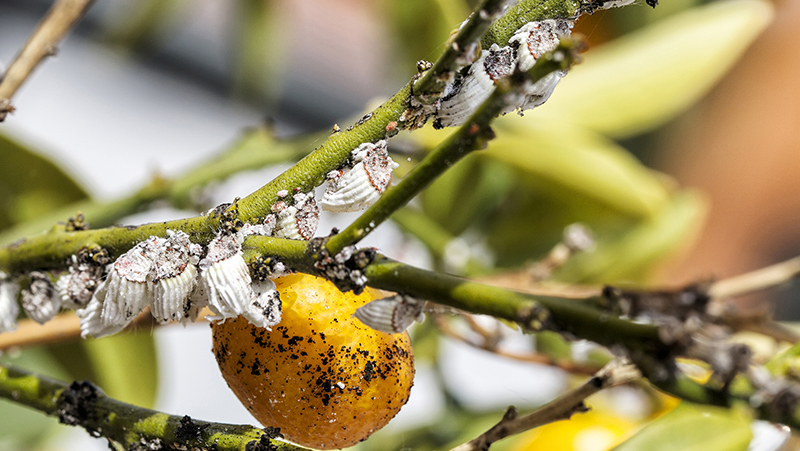Yates Account
Join now
Create a Yates account today!
Sign up to join the Yates Garden Club for monthly e-mails packed with seasonal inspiration, tips for success & exclusive promotions.
Plus if you’re a Garden Club member you can take part in the Yates Growing Community - a blog to share successes, get advice & win prizes in fun challenges along the way!

Forgot password
Enter the email address associated with your account, and we'll email you a new password.
Hemiptera

What are Scale Insects?
There are two main groups of scale insects, both of which spend most of their lives as immobile adults under a coating, sucking the sap from stalks, leaves and stems.
- Hard scale (for example Red Citrus Scale) has an oyster like coating and is difficult to control. Also known as armoured scale.
- Soft scale (for example Pink Wax Scale and Soft Brown Scale) are usually found on the mid-rib of leaves and stalks of host plants.
The most common is White Wax Scale which can be seen in large patches of white waxy material along stems and shoots. The wax covers the insects which feed on the sap. The adult scale lays up to 1000 eggs that hatch into crawlers. These crawlers move to a nearby feeding site where they set up home feeding on the sap of the plant. It is at this crawler stage the scale is most vulnerable as there is no waxy coating to protect them.
There are other different types of scale and some scale insects are host specific, such as rose scale, white palm scale, gum tree scale and tea scale (camellias). Others attack a variety of hosts such as white wax scale occurring on gardenias and citrus; and cottony cushion scale occurring on figs, rose, magnolias, grevilleas and citrus.
Turn the leaves over and look for small raised bumps. Scale insects are tiny creatures that hide underneath a protective covering and suck the sap out of leaves.
How to protect your plants from Scale Insects
Apply Yates Natures Way Organic Citrus, Vegie Ornamental Spray Ready to Use directly on to Scale Insects.
Regular spraying on the undersides of the leaves, so as to come into direct contact with the scale, will help bring scale insects under control.
Symptoms
If your citrus tree is dropping leaves, twigs and branches are dying back, and/or the fruit is stunted or distorted. If you’ve noticed small yellow spots appearing on your citrus leaves any of these symptoms may indicate an infestation of citrus scale pests.
Other signs are white patches on stems or pink or brown raised dome like structures on leaves and stalks about 3-5mm.
Sooty Mould grows on the honeydew the scale insects secrete. Scale can cause death of stems if infestation is heavy.
Plants impacted
- Roses
- White palm
- Gum trees
- Camellias
- Gardenias
- Citrus
- Figs
- Magnolias
- Grevilleas
- Pittosporum
















Share
Share this article on social media